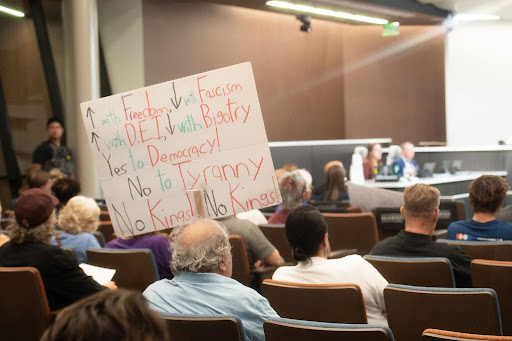Study links education with economic success
Cameron Abbott
Mesa Legend
One of the hottest topics in the political sphere of debate is the subject of income inequality.
With the heraldic candidate Sen. Bernie Sanders, the topic has been the shadow cast over the upcoming 2016 election. And nowhere does it strike a stronger chord than in the minds and hearts of the collegiate host that make up a large part of the voter base. After the 2008 recession, Arizona’s struggle to climb back to prior heights of economic success has led to budget cuts across state funded programs, and the effect has been significant in education.
With Arizona’s economic future being held in the balance, a recent study commissioned study by College Success Arizona (CSA) gave insight into how access, support, and viability of Arizona’s colleges and universities are the key to regaining economic prominence in the state’s future. With Gov. Doug Ducey increasing the K-12 budget by an estimated $344 million annually by giving the programs access to up to 10 percent of the state’s land trust, the study gives credence to the continued increase in budget for surgically precise injections from other income sources, as seen with Gov. Ducey’s plan.
The study has also shown that the appropriate measures going forward are not in just attainment, but in creating a stronger foundation. CSA’s CEO Rich Nickel had his office release in an executive analysis of the study. “It’s pretty well known that Arizona, from a funding respective to education at all levels, ranks traditionally in the bottom five of the United States,” Nickel said. “That’s something we have to work on, and we’re not as close as we’d like to be.” “We have legitimate opportunity, even by making minimal progress towards the opportunities we have lined up in the agenda of the report, to make billions of dollars in impact, “ Nickel added. “Those opportunities are in reach, and even if we get halfway to those goals, it’s still billions of dollars into the economy.”
With questions of the increased need for college education, the issues begin at the lower levels of education. “We’re not graduating enough kids from high school to enter the pipeline to get more degrees,” Nickel said. “75 percent of kids who start high school who will graduate. In other states that are high-performing, that number is closer to 90 percent.” Another problem identified by Nickel is the need for higher educational standards. He explained that, of the 75 percent of high schoolers that graduate, only around half are prepared to attend college without having to take remedial courses.
The issue, Nickel said, is with high schools. “I don’t know if the solution is Common Core,” he said. “But what I do know is that we’re not preparing our students well enough in high school so they can succeed in college, and the numbers prove that out.” The “serving” of Arizona’s Department of Education late last year with Common Core was seen as a mostly symbolic and political gesture, as the board did not vote to change any of the standards. In regard to students currently engaged with their college or university, there seems to be a focus on providing more substantive counseling, and more effective advising.
Nickel identified first-generation college students as another key group. “We have a lot of college students that are first-gen college students. And that’s one of the things that so important in this report,” Nickel said. “The opportunities we have to really grow the economy, to really grow the student base, comes from students whose parents who likely did not attend college.” “The impact is not only going to be upon them and their family, but also it’s going to be on everybody they touch going forward.” Nickel said.
Predicting the future of college attendance, Nickel set his sights on continuing a cycle from parent to their children. “As we get further down the road, the college kids today are going to be parents that are going to coach their kids on how to succeed, and will know the value of this higher education,” Nickel said. “That’s going to be a big policy shift and be a big difference.”









